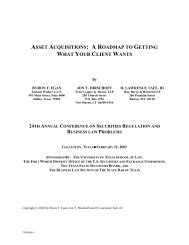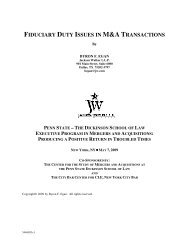Early Termination and Liquidation Provisions in Energy Trading and ...
Early Termination and Liquidation Provisions in Energy Trading and ...
Early Termination and Liquidation Provisions in Energy Trading and ...
Create successful ePaper yourself
Turn your PDF publications into a flip-book with our unique Google optimized e-Paper software.
(<strong>in</strong>clud<strong>in</strong>g any option to enter <strong>in</strong>to any of the forego<strong>in</strong>g); (B) anycomb<strong>in</strong>ation of the forego<strong>in</strong>g; or (C) a master agreement for any of theforego<strong>in</strong>g together with all supplements.” 69This def<strong>in</strong>ition of swap agreement is sufficiently broad as to generally <strong>in</strong>clude any type of derivativetransaction.b. Importance of exemptions from the automatic stayExemptions from the automatic stay are important <strong>in</strong> the context of master agreements because they permitthe early term<strong>in</strong>ation <strong>and</strong> liquidation of master agreements <strong>and</strong> the setoff of obligations without wait<strong>in</strong>g for<strong>and</strong> obta<strong>in</strong><strong>in</strong>g bankruptcy court approval. These exemptions stem from: (i) the recognition that f<strong>in</strong>ancialmarkets require the expenditure of large amounts of capital to generate a narrow profit marg<strong>in</strong>; (ii) the factthat much of this capital is committed <strong>in</strong> reliance on the right to net the amounts owed between the parties;<strong>and</strong> 70 (iii) the potential for abuse if a bankruptcy trustee were permitted to cherry-pick transactions, i.e., acceptthose transactions favorable to the bankrupt party <strong>and</strong> reject those that are unfavorable, particularly if thetrustee is the debtor <strong>in</strong> possession. 71 The loss of this right would significantly impair the function<strong>in</strong>g of thecommodity <strong>and</strong> f<strong>in</strong>ancial markets <strong>and</strong> greatly reduce the liquidity of those markets. 72 If these transactionswere not exempt from the automatic stay, “a party would not be able to unilaterally close out its marketsensitivecontracts with a bankrupt counterparty, with the risk of unrecoverable losses <strong>and</strong> the potential for adom<strong>in</strong>o cha<strong>in</strong> of bankruptcies <strong>and</strong> receiverships affect<strong>in</strong>g other commercial <strong>and</strong> f<strong>in</strong>ancial <strong>in</strong>stitutionsparticipat<strong>in</strong>g <strong>in</strong> the market.” 73 However, despite the importance of this right, the Bankruptcy Code does notoffer any affirmative right to term<strong>in</strong>ate <strong>and</strong> liquidate forward <strong>and</strong> swap contracts but rather preserves any<strong>in</strong>dependently exist<strong>in</strong>g right the parties may otherwise so possess. 74Limitations to the exemptions to the automatic stay directly impact energy market<strong>in</strong>g <strong>and</strong> trad<strong>in</strong>g <strong>in</strong>dustryparticipants. While the Bankruptcy Code permits the setoff of any payments that arise out of any swapagreement, 75 it limits setoff under forward contracts to the setoff of marg<strong>in</strong> payments or settlement paymentsaris<strong>in</strong>g out of forward contracts. 76 To broaden the forward contract setoff rights that are exempt from theautomatic stay, some <strong>in</strong>dustry participants have <strong>in</strong>serted provisions <strong>in</strong>to their master agreements stat<strong>in</strong>g thatamounts owed under each agreement serve as collateral under every other agreement between the parties, thusrecharacteriz<strong>in</strong>g all amounts owed between the parties as collateral. Although this strategy does not appear tohave been approved by any court or regulatory body, its supporters suggest that its recent popularity amongenergy trad<strong>in</strong>g companies <strong>and</strong> the absence of any policy reason not to allow this practice lend weight to thetheory of its enforceability.Section 553(a) of the Bankruptcy Code recognizes a creditor’s right to setoff amounts owed to a debtoraga<strong>in</strong>st amounts owes to the creditor, provided: (i) all setoff amounts arose prior to the commencement of thebankruptcy proceed<strong>in</strong>g; (ii) the obligations are enforceable under applicable law <strong>and</strong> are not otherwise subjectto disallowance under the Bankruptcy Code; <strong>and</strong> (iii) the parties owe such amounts <strong>in</strong> the same capacity. 77Parties are deemed to owe each other amounts <strong>in</strong> the “same capacity” when the amounts are owed <strong>in</strong> theparties’ own names <strong>and</strong> not <strong>in</strong> a fiduciary capacity. 78 A creditor can file a motion for relief from theautomatic stay <strong>and</strong> the Bankruptcy Court will typically rule on such a motion with<strong>in</strong> thirty to sixty days. Ifthe motion is denied, the creditor should be able to withhold payments to the debtor, thereby preserv<strong>in</strong>g theright of setoff, 79 but will not be able to exercise the right to book the setoff <strong>and</strong> apply the funds until the endof the bankruptcy proceed<strong>in</strong>g, a delay that could be years <strong>in</strong> duration.Whether or not the automatic stay applies is not determ<strong>in</strong>ative of whether the non-default<strong>in</strong>g party possesses aright to setoff but rather of the tim<strong>in</strong>g of the exercise of such right. If the automatic stay applies, the nondefault<strong>in</strong>gparty cannot effectuate any setoff until the bankruptcy court permits such actions to be taken. If atransaction is exempt from the automatic stay, the non-default<strong>in</strong>g party may immediately take action withoutany delay on account of the bankruptcy proceed<strong>in</strong>g.C. Avoidance action claims11
















